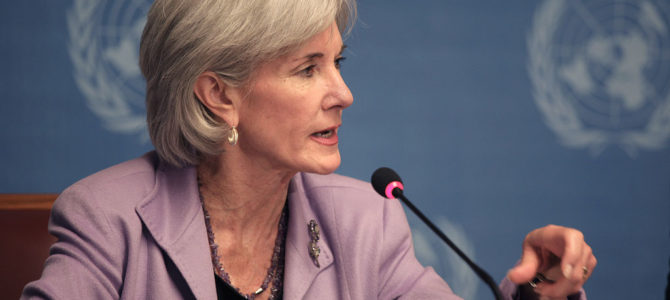
Of all the people crying “sabotage” when it comes to Obamacare, Kathleen Sebelius might be the most qualified on the subject. Presiding over the disastrous “launch” of healthcare.gov in the fall of 2013, then-Health and Human Services Secretary Sebelius famously testified before Congress: “Hold me accountable for the debacle—I’m responsible.”
Likewise, in her claims this week that the Trump administration “has consistently tried to undermine the law that is the law of the land,” Sebelius knows of which she speaks. She presided over numerous actions that violated the text of Obamacare, and the Constitution, to thwart the will of Congress and undermine “the law of the land”—Obamacare as it was actually written, not as Democrats wished it were written—and the rule of law in general.
1. Unconstitutional ‘Like Your Plan’ Fix
As Sebelius presided over the healthcare.gov “debacle,” the Obama administration faced a serious political crisis. While the federally run exchange melted down, millions of Americans received cancellation notices in the mail, learning that because their plans did not meet Obamacare’s myriad new regulations, they would lose their coverage effective January 1, 2014.
The notices demonstrated the emptiness of Obama’s repeated promises that individuals who liked their plans could keep them—PolitiFact’s “Lie of the Year.” Moreover, the malfunctioning website created the possibility that millions of Americans could lose their existing coverage while having no way to purchase a replacement policy.
In response to the uproar, the Obama administration essentially decided to take the law into its own hands. Sebelius’ department issued a memo saying it would refuse to enforce the law for certain categories of insurance policies, allowing states and insurers the latitude to maintain individuals’ prior coverage. Even supporters of Obamacare like Nicholas Bagley said the administration’s actions violated the Constitution—the executive refusing to enforce provisions of a law it found politically inconvenient.
This space has previously argued that the Trump administration must enforce Obamacare’s individual mandate, despite any opposition to the mandate on policy grounds, given that the executive must faithfully execute the laws—all of them. But given that Sebelius failed to enforce parts of the law as written for political reasons, who is she to argue that Trump cannot do likewise?
2. Illegal Reinsurance Subsidies
The Government Accountability Office last year ruled that the Obama administration “undermined the law that is the law of the land,” as Sebelius alleges of the Trump administration. Specifically, GAO found that the Obama administration illegally prioritized health insurance companies over American taxpayers, funneling billions of reinsurance dollars that should have remained in the U.S. Treasury (to pay for a separate Obamacare program) to corporate welfare payments to insurance companies. After this rebuke from nonpartisan auditors, the Obama administration still made no attempt to comply with the law as interpreted by GAO.
If Sebelius is as concerned about “undermin[ing] the law that is the law of the land” as she claims, she should have publicly demanded that the Obama administration comply with the law, and the GAO ruling. She did no such thing then, and is unlikely to ask the Trump administration to claw back the corporate welfare payments to insurers now.
3. Unconstitutional Payments to Insurers
The Obama administration did not just violate the law in making payments to health insurers, it violated the Constitution as well. The text of Obamacare—“the law that is the law of the land,” in Sebelius’ words—included no appropriation making payments to insurers to reimburse them for cost-sharing reductions provided to individuals. The Obama administration made the payments anyway.
A federal judge ruled against the Obama administration’s actions last year, stating that they violated the Constitution for spending money without an appropriation. While the payments have continued pending an appeal, if Sebelius worries about preserving “the law that is the law of the land,” then she would support implementing the law as written, and stopping the payments immediately, unless and until Congress approves an explicit appropriation.
Ends and Means
Sebelius’ comments show a fundamental disconnect between means and ends. The Obama administration’s actions suggest a concern largely, if not solely, about signing up as many individuals for taxpayer-funded coverage as possible. If achieving that object meant violating the law, or the Constitution, so be it—the ends justified the means.
Sebelius’ real disagreement therefore doesn’t lie with the Trump administration on “undermining the law.” She did plenty of that herself, likely with full knowledge she was doing so. Instead, her true objection lies in the fact that the Trump may have different policy ends than ones she supports.
If Sebelius wants to espouse different policy positions than the current administration, that is her right. But given the ways in which the last administration repeatedly violated Obamacare to suit its own purposes, conservatives should take no lessons from Sebelius on how to avoid “undermining the law.” Physician, heal thyself.









